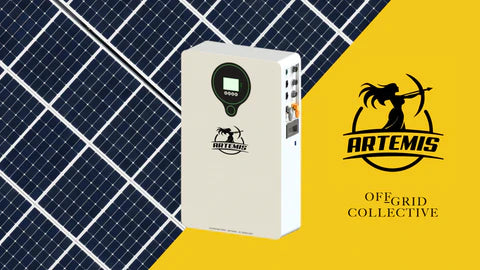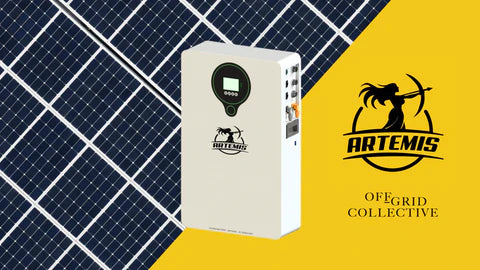NZ Infrastructure on the brink: Off-grid innovations could make NZ a global green leader
In the lush landscapes of Aotearoa, a land celebrated for its stunning natural vistas, a pressing issue looms: an infrastructure deficit that raises questions about the nation's sustainable future and the quality of life of its inhabitants (us).
Infrastructure, covering transport, water, and energy sectors, is the foundation of a nation's socio-economic fabric. With the shadow of this shortfall hovering over New Zealand, the time is ripe to delve into robust, sustainable, and inventive strategies. Within this paradigm, the relevance of septic tanks, rainwater tanks, and solar power becomes unmistakably clear.
Understanding New Zealand's Infrastructure Dilemma:
The steady rise in population, urban sprawl, and the wear and tear on existing amenities have amplified the infrastructure problems facing New Zealand. This delay in infrastructure adaptation has manifested in congestion, transport bottlenecks, and sporadic water shortages. Disturbing instances such as Queenstown's recent freshwater supply challenges and Auckland's sewage complications cast a spotlight on this looming infrastructure gap. During the leaders' discourse in the 2023 Election, a staggering forecast emerged: an annual expenditure of around 30 billion for the forthcoming three decades to rejuvenate, overhaul, and modernise the existing infrastructure, ensuring it meets global benchmarks and accommodates the expanding populace.
In such a scenario, we at Off-Grid Collective have been mulling over New Zealand's unique stance. By managing our own wastewater, harvesting rain, and producing our own power, there lies an opportunity to reclaim our autonomy and lessen the load on our vulnerable infrastructure. It's important to acknowledge that many Kiwis might find it challenging to transition to such an independent lifestyle. Hence, for those of us who can, there arises a moral responsibility to tread this sustainable path, paving the way for the collective.
Septic Tanks: A Deep Dive into Sustainable Wastewater Management
Various New Zealand locales are either deprived of sewage infrastructure or grapple with deteriorating systems. Growing urban spaces are confronted with rising costs and complexities associated with centralised sewage networks.
The Merits of Septic Systems:
- Concentrated Solution: Septic tanks offer a localised wastewater treatment avenue, removing the need for expansive conduits and sprawling treatment plants.
- Durability with Care: With considerate installation, their upkeep demands are minimal, promising longevity.
- Environmentally Considerate: Their mode of operation is less demanding on the environment compared to conventional sewage methodologies, avoiding energy-intensive procedures.
Rainwater Tanks: Charting a Sustainable Water Future
Freshwater tanks, also known as rain barrels, are gaining traction globally due to their dual benefits: environmental and practical.
Water Conservation Insights:
- Financial Prudence: Harnessing rainwater can lead to notable reductions in public water dependence, translating to financial savings.
- Alternative Reservoir: In regions battling water contaminations or scarcities, such tanks emerge as a vital reserve.
Environmental Paybacks:
- Relieving Public Pressure: Tapping into rainwater can ease the burden on local water supply chains and purification systems.
- Ecological Harmony: Efficient rainwater harvesting can minimise runoff into stormwater drains, mitigating erosion and waterway pollution, and aiding groundwater rejuvenation.
- Energy Savings: The energy requisites for processing and distributing public water get slashed when households resort to rainwater.
Solar Power: Illuminating a Sustainable Path Forward
Given New Zealand's escalating energy requirements, fortifying its renewable energy portfolio is paramount. Here, solar energy shines brightly.
Solar Power's Promise:
- Fading Reliance on Fossil Fuels: Solar installations reduce dependence on non-renewable energy sources, thus reducing environmental degradation.
- Power Decentralisation: Solar adoption allows households and businesses to generate their own power, alleviating stress on national energy grids and reducing large infrastructure needs.
- Economic Persuasion: The declining costs of solar installations, paired with potential energy savings, offer a financially friendly solution.
Harmonising Solutions:
An interlinked approach could see solar arrays powering septic systems, ensuring environmentally-conscious wastewater management. Additionally, with technological developments, solar-powered sensors could oversee septic and freshwater tanks, offering timely maintenance reminders to homeowners and thereby enhancing system longevity.
In Summary:
Confronted with its infrastructure tribulations, New Zealand stands on the cusp of transformative, sustainable innovations. By channelling focus on septic systems, freshwater tanks, and solar power, the nation has the potential to redress its infrastructural shortfall, positioning itself as a beacon of sustainable and visionary progress.
It is an earnest call to New Zealanders: Let us champion inventive paradigms and sculpt a model for the world. Such a commitment is not just to ourselves, but to our community, environment, and the global tapestry of which we are a part.
 is here! Shop now, pay later in 4 easy installments
is here! Shop now, pay later in 4 easy installments






